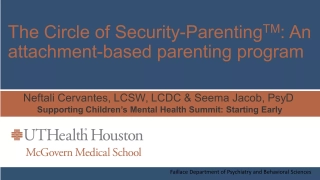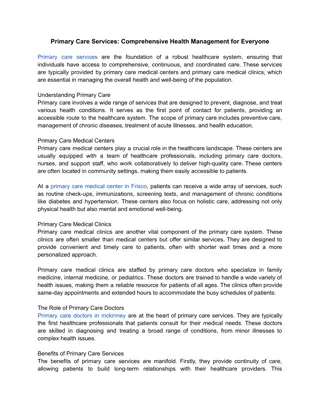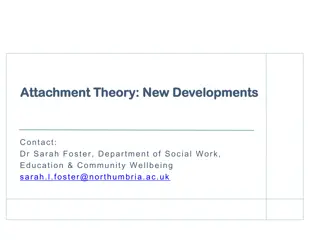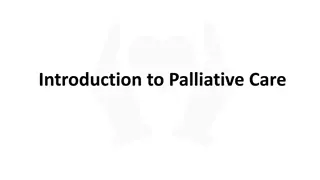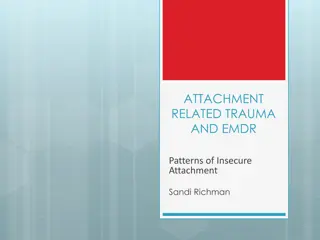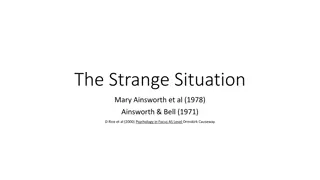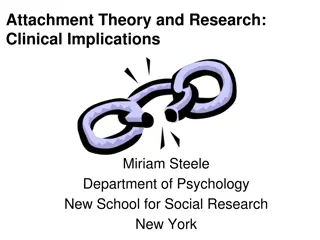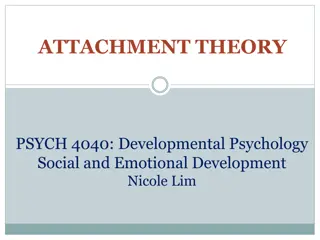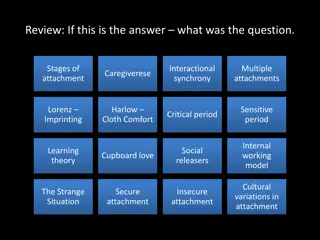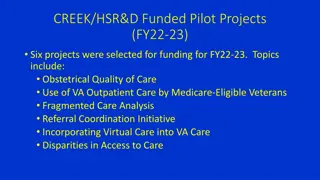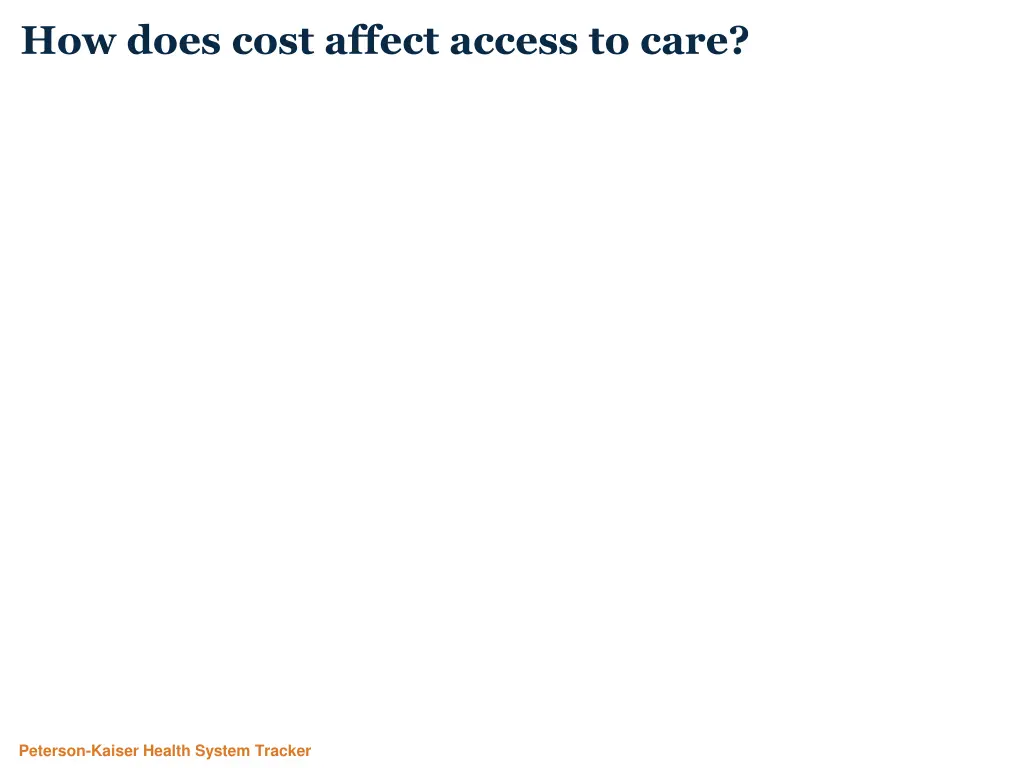
Impact of Cost on Healthcare Access: Statistics Revealed
Learn about the significant impact of healthcare costs on access to care based on statistics from the Peterson-Kaiser Health System Tracker. Discover how a considerable percentage of adults delay or forgo care due to financial concerns, particularly affecting those in worse health and without insurance. Lower-income individuals face more cost-related access issues compared to higher-income adults.
Download Presentation

Please find below an Image/Link to download the presentation.
The content on the website is provided AS IS for your information and personal use only. It may not be sold, licensed, or shared on other websites without obtaining consent from the author. If you encounter any issues during the download, it is possible that the publisher has removed the file from their server.
You are allowed to download the files provided on this website for personal or commercial use, subject to the condition that they are used lawfully. All files are the property of their respective owners.
The content on the website is provided AS IS for your information and personal use only. It may not be sold, licensed, or shared on other websites without obtaining consent from the author.
E N D
Presentation Transcript
How does cost affect access to care? Peterson-Kaiser Health System Tracker
About 1 in 10 adults report that they delayed or did not get care because of its cost Percent of adults who reported delaying or going without care due to costs, 2013 12% 11% 10% 9% 8% 7% 6% 4% 2% 0% Delayed care Did not get care due to cost Yes to either (delayed and/or did not get care due to cost) because worried about cost Source: Kaiser Family Foundation analysis of National Health Interview Survey Peterson-Kaiser Health System Tracker
Most adults are in better health and most have health insurance Percent of adults who reported being in worse health or without insurance, 2013 90% 83% 80% 70% 60% Better health 87% 50% 40% 32% 29% 30% 26% 17% 20% 10% 10% 3% 0% Excellent Very Good Good Fair Poor Insured Uninsured Source: Kaiser Family Foundation analysis of National Health Interview Survey Peterson-Kaiser Health System Tracker
Adults who are in worse health have more difficulty accessing care due to cost Percent of adults who reported delaying or going without care due to cost, 2013 Better Health Worse Health 25% 22% 20% 20% 17% 15% 9% 10% 8% 6% 5% 0% Delayed care Did not get care due to cost Yes to either (delayed and/or did not get care due to cost) because worried about cost Source: Kaiser Family Foundation analysis of National Health Interview Survey Peterson-Kaiser Health System Tracker
Uninsured adults are more likely to delay or go without care due to cost Percent of adults who reported delaying or going without care due to cost, 2013 Insured Uninsured 35% 32% 30% 28% 24% 25% 20% 15% 10% 7% 6% 4% 5% 0% Delayed care Did not get care due to cost Yes to either (delayed or did not get care due to cost) because worried about cost Source: Kaiser Family Foundation analysis of National Health Interview Survey Peterson-Kaiser Health System Tracker
Lower income adults report more cost-related access problems than higher income adults Percent of adults who report delaying and/or going without medical care due to costs, 1998 2013 All adults 200% FPL and above Below 200% FPL 40% 35% 30% 25% 20% 17% 14% 15% 13% 10% 9% 5% 6% 5% 0% 1998 2003 2008 2013 Source: Kaiser Family Foundation analysis of National Health Interview Survey Note: Shading represents years when a recession took place in the U.S. Peterson-Kaiser Health System Tracker
The economic downturn may have affected those in worse health more acutely than those in better health Percent of adults who report delaying and/or going without medical care due to costs, 1998 2013 All adults Better health Worse health 40% 35% 30% 25% 25% 22% 18% 20% 15% 10% 10% 8% 5% 6% 0% 1998 2003 2008 2013 Source: Kaiser Family Foundation analysis of National Health Interview Survey Note: Shading represents years when a recession took place in the U.S. Peterson-Kaiser Health System Tracker
Uninsured adults experienced more difficulty accessing care due to cost during the economic downturn Percent of adults who report delaying and/or going without medical care due to costs, 1998 2013 All adults Insured Uninsured 40% 35% 35% 31% 30% 24% 25% 20% 15% 10% 7% 5% 5% 5% 0% 1998 2003 2008 2013 Source: Kaiser Family Foundation analysis of National Health Interview Survey Note: Shading represents years when a recession took place in the U.S. Peterson-Kaiser Health System Tracker
Adults are most likely to go without dental care and prescriptions because of cost reasons Percent of adults who report delaying and/or going without medical care due to costs, by type of care 2013 35% 30% 25% 20% 15% 13% 10% 8% 7% 5% 4% 5% 2% 0% Mental health or counseling Follow-up care Specialist Eye glasses Prescriptions Dental care Source: Kaiser Family Foundation analysis of National Health Interview Survey Peterson-Kaiser Health System Tracker
Adults in worse health report much higher rates of delayed or forgone medical care due to cost Percent of adults who report delaying and/or going without medical care due to costs, by type of care 2013 Better health Worse health 35% 30% 25% 25% 20% 20% 18% 15% 13% 11% 11% 10% 6% 6% 6% 4% 5% 3% 1% 0% Mental health or counseling Follow-up care Specialist Eye glasses Prescriptions Dental care Source: Kaiser Family Foundation analysis of National Health Interview Survey Peterson-Kaiser Health System Tracker
About one in five uninsured adults delayed or went without needed prescriptions because of the cost Percent of adults who report delaying and/or going without medical care due to costs, by type of care 2013 Insured Uninsured 35% 32% 30% 25% 21% 20% 18% 15% 14% 15% 9% 10% 6% 5% 5% 5% 3% 2% 1% 0% Mental health or counseling Follow-up care Specialist Eye glasses Prescriptions Dental care Source: Kaiser Family Foundation analysis of National Health Interview Survey Peterson-Kaiser Health System Tracker
Uninsured adults and those in worse health are more worried about paying bills for routine medical care Percent of adults who worry about paying medical bills for routine care, by health and insurance status, 2013 Better health Worse health Insured Uninsured 50% 50% 45% 45% 45% 45% 41% 40% 40% 35% 35% 31% 30% 28% 30% 30% 27% 24% 25% 25% 20% 19% 20% 20% 18% 18% 17% 14% 13% 15% 15% 10% 10% 10% 5% 5% 0% 0% Very worried Moderately Not too worried Not worried at all Very worried Moderately Not too worried Not worried at all worried worried Source: Kaiser Family Foundation analysis of National Health Interview Survey Peterson-Kaiser Health System Tracker
Families with uninsured adults and those in worse health report more problems paying medical bills Percent of adults with difficulty paying medical bills, by health and insurance status, 2013 All adults Better health Worse health All adults Insured Uninsured 35% 35% 33% 32% 32% 32% 30% 30% 25% 25% 23% 23% 22% 21% 20% 20% 17% 17% 15% 14% 15% 15% 10% 10% 5% 5% 0% 0% Problems with bills for routine care Paying off medical bills over time Problems with bills for routine care Paying off medical bills over time Source: Kaiser Family Foundation analysis of National Health Interview Survey Peterson-Kaiser Health System Tracker
Uninsured adults are less likely to have a usual source of healthcare Percent of adults without a usual source of care, by health and insurance status, 2013 All adults Better health Worse health All adults Insured Uninsured 100% 100% 91% 89% 90% 90% 84% 84% 83% 80% 80% 70% 70% 60% 60% 50% 50% 50% 40% 40% 30% 30% 20% 20% 10% 10% 0% 0% Has Usual Source of Care Has Usual Source of Care Source: Kaiser Family Foundation analysis of National Health Interview Survey Peterson-Kaiser Health System Tracker
Uninsured adults who lack a usual source of care are also more likely to forgo preventive care Percent of uninsured adults who did not report a usual source of care, who reported going without preventive care, 2013 All adults Insured Uninsured 100% 90% 80% 72% 70% 63% 60% 52% 50% 40% 30% 20% 10% 0% Of those with no usual source of care, percent who go without preventive care Source: Kaiser Family Foundation analysis of National Health Interview Survey Peterson-Kaiser Health System Tracker
Sicker and uninsured adults without usual sources of care tend to report cost barriers Reported reason for having no usual source of care, by health and insurance status, 2013 All adults Better health Worse health All adults Insured Uninsured 100% 70% 90% 59% 60% 80% 70% 50% 62% 56% 60% 53% 40% 36% 50% 40% 30% 36% 33% 30% 20% 17% 20% 9% 8% 6% 10% 5% 5% 10% 5% 2% 0% 0% Did Not Get Around to It Too No Medical Problems Expensive/Cost Reasons Did Not Get Around to It Too Expensive/Cost Reasons Source: Kaiser Family Foundation analysis of National Health Interview Survey Peterson-Kaiser Health System Tracker

